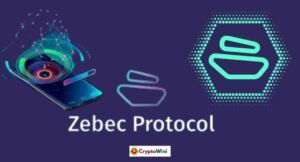{ aws blockchain, aws blockchain as a service, aws blockchain certification, aws blockchain service, aws blockchain jobs, aws blockchain tutorial, aws blockchain templates, aws blockchain pricing, aws blockchain alternative, how to set up a blockchain demo in AWS, how to use AWS blockchain templates}
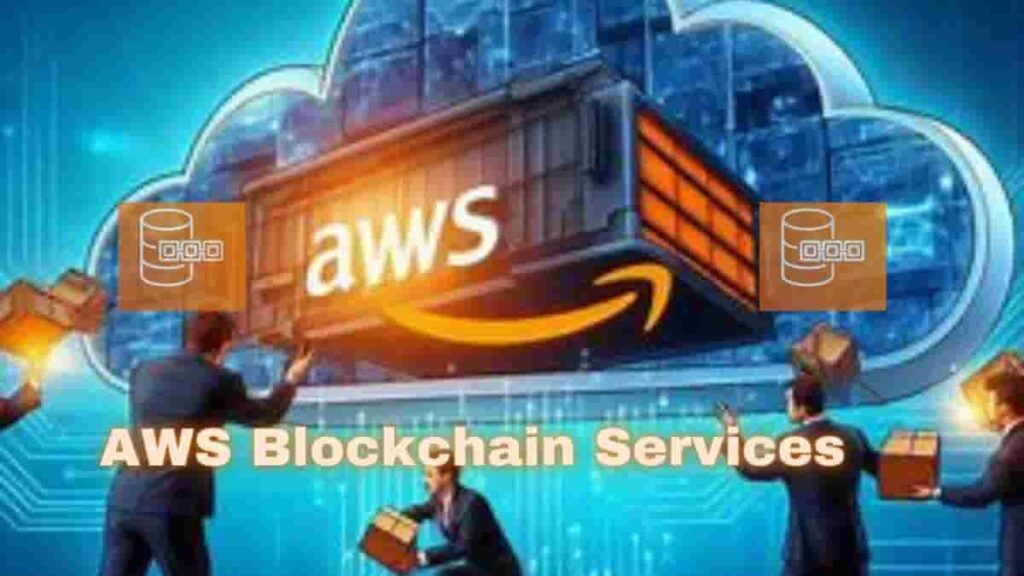
Diving Deep into AWS Blockchain Services
Blockchain technology has exploded in popularity over the last few years, with its potential to transform industries like finance, supply chain, and healthcare. As enterprises look to harness the power of blockchain, many are turning to cloud providers like Amazon Web Services (AWS) to simplify development and reduce infrastructure costs.
AWS offers a robust set of managed blockchain services that help teams quickly build decentralized applications without needing deep expertise in distributed systems. Whether you want to join popular public networks like Ethereum or build your own customizable private network, AWS makes it easy and cost-effective.
In this comprehensive guide, we will dive deep into all aspects of AWS’ blockchain offerings including detailed overviews of each service, key benefits, practical use cases, tips for getting started, certification opportunities, and more. Let’s get started!
Brief Background on Blockchain Technology
For those less familiar, blockchains are distributed ledgers that record transactions in an immutable, transparent way without needing central authorities. Data is stored in groups of blocks that link together to form a chain, giving the technology its name.
Some key properties that make blockchains invaluable across industries:
- Decentralization – No single entity controls the network
- Transparency – All participants have real-time visibility of transactions
- Security – Cryptography ensures integrity and prevents tampering
- Immutability – Transactions cannot be altered, only appended
Blockchains enable direct transactions between untrusted parties without intermediaries. This eliminates inefficiencies, delays, and costs posed by traditional transaction systems.
Popular blockchain platforms like Ethereum allow developers to build decentralized applications (dApps) that inherit the same useful properties. Smart contracts encode complex business logic and rules that execute automatically when conditions are met.
Common Use Cases
- Supply Chain – Track the origin and movement of goods in real-time
- Financial Services – Clear and settle payments without middlemen
- Identity Management – Store KYC data securely in a unified ecosystem
- Voting – Maintain transparent and tamper-proof election record
Many enterprises are still struggling to adopt blockchain due to talent scarcity and infrastructure complexity. AWS’ managed services address these barriers with easy setup, automation, and on-demand support.
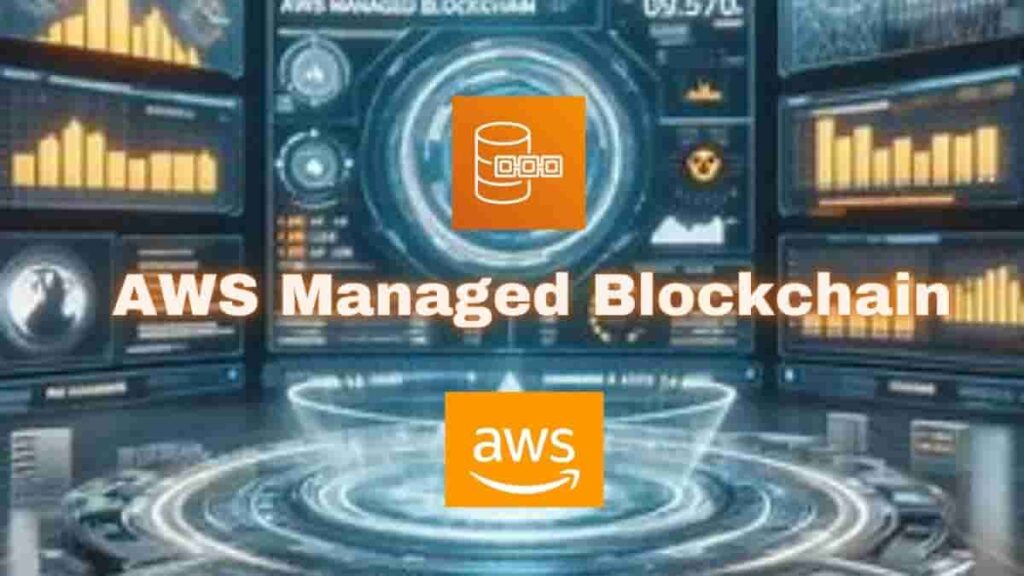
AWS Blockchain Services
AWS offers a suite of managed blockchain services designed to help teams easily build blockchain-based applications without needing to become experts in distributed systems:
AWS Managed Blockchain
AWS Managed Blockchain is a fully managed service that makes it easy to create and manage scalable blockchain networks with just a few clicks. Key capabilities include:
- Supports popular open-source frameworks like Hyperledger Fabric and Ethereum
- Let you create either public or private networks
- Automates infrastructure management including capacity provisioning, software patches, cluster availability monitoring, and failover
- Integrates with other AWS tools like Amazon MQ, Amazon QLDB, AWS CloudTrail, Amazon SNS, and more
- Provides secure networking infrastructure within and across AWS accounts
- Offers SDKs and APIs for connecting applications and performing administrative tasks
- Usage-based pricing – only pay for resources used
Managed Blockchain drastically reduces the effort and complexity involved with setting up blockchain infrastructure. Users don’t need any specialized blockchain skills or knowledge to operate a functioning network. The service also enables hybrid deployments across both cloud and on-premises environments.
Use cases include supply chain tracking, credential issuance, media rights management, self-sovereign identity, financial settlements, and more. Both consortiums and individual organizations can benefit from increased immutability, transparency, resiliency, and simplified coordination.
Amazon Quantum Ledger Database
Amazon QLDB is a centralized ledger database that provides transparent, immutable, and cryptographically verifiable transaction logs for regulated industries such as banking, finance, insurance, and healthcare where tamper resistance is critical. Key features:
- Fully managed, serverless ledger database
- Uses cryptographic chains to ensure data has not been altered
- Timestamped journal logs with a complete history of all changes
- Mathematical proof of data integrity via cryptographic checksums
- Fine-grained access controls and encryption
- Integrates easily with AWS big data and analytics services
As QLDB is not a traditional blockchain, it offers significantly higher transaction throughput along with the ability to execute complex queries on structured data. Users don’t have to write additional code in order to ensure the integrity of application data.
Common use cases include retail payments, stock exchanges, regulatory compliance, supply chain analytics, centralized cryptocurrencies, and any system of record needing complete, verifiable history.
Amazon Managed Streaming for Apache Kafka
Amazon MSK is a fully managed service enabling teams to build data streaming pipelines with Apache Kafka without having provision infrastructure. While not a blockchain service itself, Kafka is commonly used as the backbone messaging layer to transmit data between blockchain network nodes. With MSK, users can focus on high-value application development rather than cluster management.
Key capabilities offered by Amazon MSK:
- Fully manages Apache ZooKeeper clusters
- Automatically scales Kafka brokers based on usage
- Encryption of data at rest and in transit
- Dynamic partition assignment to handle load spikes
- Integration with AWS monitoring, security, and identity tools
- Automatic failure detection and replacement of unhealthy nodes
Use cases include capturing blockchain events and streaming data to other analytical platforms, building centralized message buses, powering microservices architectures, and ingesting high-volume operational telemetry.
MSK simplifies leveraging Apache Kafka for secure and durable data streaming at scale. Along with AWS blockchain tools, it provides a robust platform for blockchain-enabled digital transformation initiatives.
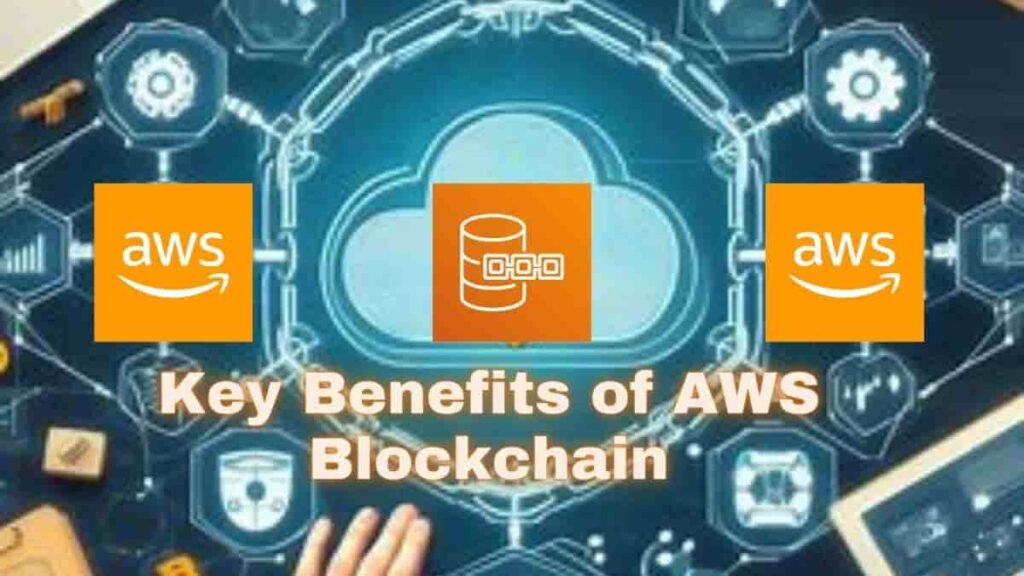
Key Benefits of AWS Blockchain
There are several compelling advantages to using AWS’ managed blockchain services over alternative options:
Ease of Use
AWS blockchain solutions dramatically reduce the learning curve and management overhead typically required for running decentralized networks. Highlights include:
- No blockchain expertise required – Fully managed infrastructure lets developers focus on application logic
- Fast setup – New networks can be provisioned in minutes without manual configuration
- Intuitive interfaces – Services feature simple control panels and APIs for common tasks
- On-demand support – Get quick answers from AWS blockchain specialists if stuck
By handling low-level blockchain network functions behind the scenes, AWS allows more developers to leverage decentralized capabilities in their apps without significant specialized knowledge.
Flexibility
AWS blockchain provides the flexibility to model networks in ways that best meet application requirements:
- Public/private/hybrid models – Build accessible networks or restrict participation
- Multiple frameworks – Support for Hyperledger, Ethereum, and custom options
- Access controls – Granular permissions management via AWS IAM
- Extensibility – Customize via open APIs and community-contributed modules
Whether prototyping a proof-of-concept or running enterprise-grade infrastructure for thousands of users, AWS enables adaptable deployments matching unique needs.
Security
AWS leverages industry best practices for blockchain security:
- Infrastructure protection – Prevent unauthorized access to network resources
- Encryption – Secure data at rest and in transit over TLS
- Compliance readiness – Adheres to standards like HIPAA, PCI, FedRAMP, SOX
- Audit trails – Monitor network activity via CloudTrail integration
- AWS security capabilities – Integrate advanced threat detection, key management, and secrets functions
With AWS managing security controls and compliance behind the scenes, teams reduce risk and can focus innovation in higher business value areas.
Scalability
AWS blockchain networks effortlessly scale to handle unpredictable demand spikes driven by application growth or economic factors thanks to:
- Auto-scaling groups – Programmatically scale resources
- Decentralized data – Distribute data across infrastructure
- Multi-AZ deployments – Ensure high availability
Transaction throughput dynamically adjusts so applications can ingest increasing workloads without disruption.
By leveraging AWS’ virtually unlimited on-demand capacity, blockchains built on the cloud can grow unconstrained compared to alternatives.
Common Blockchain Use Cases on AWS
AWS’ flexible and secure blockchain services support a wide range of transactional applications across industries:
Supply Chain Tracking
Blockchain enables real-time visibility and coordination across fragmented supply chain networks. On AWS, companies can build solutions to:
- Track origin, ownership, and movement of goods
- Prevent counterfeiting and grey market diversion
- Automate vendor payments upon delivery
- Meet regulatory compliance requirements
- Identify inefficiencies and bottlenecks
With immutable and shared record-keeping, enterprises gain end-to-end transparency that minimizes disputes, overhead costs, and delays.
Financial Services
AWS blockchain streamlines clearing, settlement, and reconciliation processes in capital markets by enabling:
- Asset tokenization and trading
- Instant settlement of stock/bond transactions
- Multi-party contract workflows
- Shared customer identity/KYC data
- Automated ledger backups for auditing
Trading partners save significant time and expense by directly exchanging assets on unified networks instead of relying on banks, clearing houses, and other middlemen.
Healthcare Data Exchange
AWS empowers secure health data exchange across organizations to improve patient outcomes:
- Share medical records across providers
- Maintain a comprehensive audit trail
- Unify identity management functions
- Support research initiatives
- Ensure HIPAA, and HITECH compliance
With patient consent, blockchain centralizes medical history in a tamper-evident repository accessible to authorized parties anywhere.
More Use Cases
- Digital identities
- Certificate issuance
- Media rights management
- Elections
- Non-fungible tokens (NFTs)
These represent just a small sample of the innovations enabled by combining AWS scalability and security with the decentralized trust of blockchain.
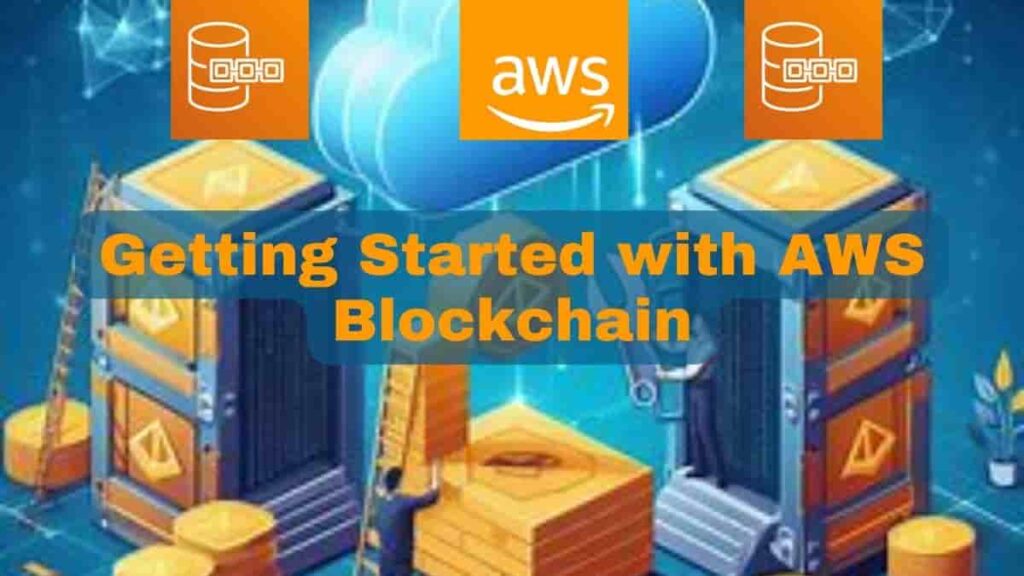
Getting Started with AWS Blockchain
For those looking to build their first blockchain project on AWS, here is a step-by-step guide:
Step 1: Select Your Blockchain Framework/Network
The first decision is whether you want to join an existing public blockchain like Ethereum or create a new private network tailored to your specific needs.
Key considerations:
- Public blockchains – Allow anyone to participate without permission. Leverage an established network like Ethereum with active community and developer tools.
- Private blockchains – Restrict access to trusted participants. Customize governance rules and permissions without needing consensus from others.
AWS supports leading open-source blockchain frameworks like Hyperledger Fabric and Ethereum. Managed Blockchain streamlines deploying infrastructure for both public and private environments.
Step 2: Provision AWS Resources
Next, use the AWS Management Console to deploy core infrastructure:
- Amazon Managed Blockchain – Creates network resources like members, nodes, peer nodes
- Amazon QLDB – Provides immutable, transparent ledger
- Amazon MSK – Handles messaging between blockchain nodes
Take advantage of guided launch workflows to automatically configure network components across VPCs, availability zones, and AWS accounts.
Step 3: Configure Your Blockchain Network
Once the infrastructure is provisioned, define network parameters:
- Consensus – Algorithm to validate transactions (e.g. proof-of-work, proof-of-stake)
- Permissions – Determine access controls for reading/writing data
- Peers – Add participants like AWS accounts, organizations, and external clients
- Performance – Scale resources to meet transaction loads
Leverage AWS APIs and SDKs to programmatically administer configurations.
Step 4: Connect Other AWS Services
Unlock additional capabilities by integrating complementary managed services:
- Lambda – Execute code in response to blockchain events
- DynamoDB – Store off-chain dataset with a document database
- EKS – Containerize and scale workloads on Kubernetes
- API Gateway – Expose network APIs to external consumers
AWS makes it seamless to build serverless architectures around core blockchain transaction pipelines.
Step 5: Start Building Blockchain Applications
Finally, begin developing applications leveraging the decentralized capabilities through AWS SDKs for languages like JavaScript, Java, Python, and more.
Launch a simple smart contract to validate functionality before connecting front-end applications that allow users to invoke transactions and display data stored on the blockchain.
Congratulations! By following these steps, your American West blockchain is ready for action on AWS!
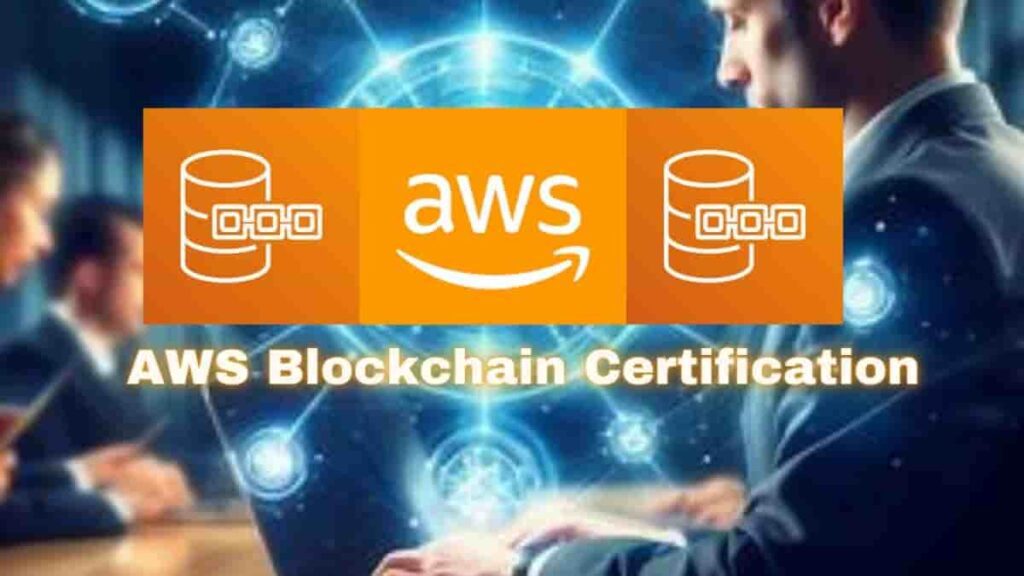
AWS Blockchain Certification
As blockchain on AWS continues to gain mainstream enterprise adoption, having the proper cloud training can help professionals differentiate themselves and advance their careers.
AWS offers an exclusive certification that validates technical skills for building and managing blockchain networks on its industry-leading cloud platform:
AWS Certified Blockchain – Specialty
The AWS Certified Blockchain – Specialty certification is designed for developers, data engineers, and solutions architects seeking to demonstrate in-depth knowledge of blockchain on AWS including:
- Building decentralized applications with Hyperledger Fabric and Ethereum
- Operating peer node infrastructure
- Translating business requirements into scalable architectures
- Governance best practices for blockchain networks
- Security, privacy, and compliance considerations
Earning this cert verifies the ability to create and integrate secure blockchain networks with other cloud services.
Who Should Become Certified?
Professionals who can benefit most from this certification include:
- Blockchain developers
- Solutions architects
- DevOps engineers
- Technical project managers
- Data engineers
- AWS cloud practitioners looking to expand skillsets
Preparing for the Exam
Make sure to thoroughly review key knowledge areas including:
- Architecting on AWS
- Building blockchain networks
- Working with blockchain frameworks like Hyperledger and Ethereum
- Writing smart contracts
- Connecting blockchain to AWS data stores
- Securing networks, wallets, keys, and applications
- Monitoring blockchain network activity
Use available exam guides and sample questions to check understanding of concepts across these domains.
By earning the Certified Blockchain – Specialty certification, technology practitioners can unlock new career opportunities on one of the hottest platforms. Validate expertise by becoming an AWS blockchain expert!
The AWS Certified Blockchain – Specialty credential proves deep technical expertise with decentralized applications on the world’s top cloud provider. Add this certification to stand out from the crowd!
Conclusion and Summary
AWS provides the most mature, enterprise-grade managed blockchain services available today. By automating provisioning, network management, and infrastructure scaling, teams can focus on building decentralized applications rather than wrestling with complex distributed systems.
Core Benefits of running blockchain workloads on AWS include:
- Simplicity – Easy network setup without deep blockchain expertise
- Flexibility – Support for diverse consensus models, permissions, frameworks
- Security – Industry-leading practices baked into all services
- Scalability – Auto-scaling and global infrastructure footprint
- Reliability – Powering the most demanding applications globally
We covered the full spectrum including technical overviews of core platform capabilities like Managed Blockchain and Quantum Ledger Database as well as practical guidance on use cases, getting started, and certification opportunities.
Blockchain enables breakthrough innovations in trust, transparency, and coordination across industries. AWS provides secure, resilient infrastructure allowing both large enterprises and lean startups to harness decentralized models.
Ready to get hands-on with blockchain? Sign up for an AWS account today to receive free usage credits and dive into the industry’s leading cloud platform for blockchain!
Here are 7 frequently asked questions with sample answers for your blog post on AWS blockchain, as well as a disclaimer:
FAQs
Q. What are the main services provided by AWS for blockchain?
The core blockchain services on AWS are Amazon Managed Blockchain, Amazon Quantum Ledger Database (QLDB), and Amazon Managed Streaming for Apache Kafka (MSK). These handle provisioning networks, providing an immutable data store, and transmitting node messages respectively.
Q. What blockchain frameworks can you use on AWS?
AWS Managed Blockchain supports leading open-source frameworks like Ethereum and Hyperledger Fabric. These allow you to build decentralized applications with smart contracts or custom business logic.
Q. Is AWS blockchain cheaper than running my own nodes?
Yes, in most cases using managed AWS blockchain services is significantly cheaper than self-managed infrastructure. You only pay for the underlying cloud resources consumed rather than owning the full stack.
Q. Is AWS blockchain compliant for regulated data?
Yes, AWS blockchain services have obtained compliance with regulations like HIPAA, PCI, SOC, ISO, and others. These certify the platform is suitable for sensitive financial transactions, healthcare data, and personally identifiable information.
Q. How hard is it to get started with AWS blockchain?
AWS has simplified blockchain management so that those without specialized skills can launch networks. User-friendly interfaces, APIs, and SDKs abstract away unnecessary complexity associated with distributed systems.
Q. Can I create private permissioned blockchains?
Yes, AWS enables you to create customized private networks where participation requires permissions. You can control network access through IAM policies, public/private encryption keys, and your identity provider integration.
Q. Can I connect other AWS services to my blockchain?
Absolutely – AWS blockchain integrates seamlessly with other managed services like Lambda, DynamoDB, SQS, and more. You can build serverless architectures enhancing core blockchain transaction pipelines.
Disclaimer
The information presented in this blog is intended for educational purposes only. CryptoWini makes no representations as to the accuracy and completeness of the information provided. All statements and opinions shared should not be considered professional financial investment advice. Users assume all risks associated with applying blockchain technologies and AWS services for target applications and workloads. Seek qualified professional expertise for any tax, accounting, legal, or financial planning questions before leveraging the solutions presented.













